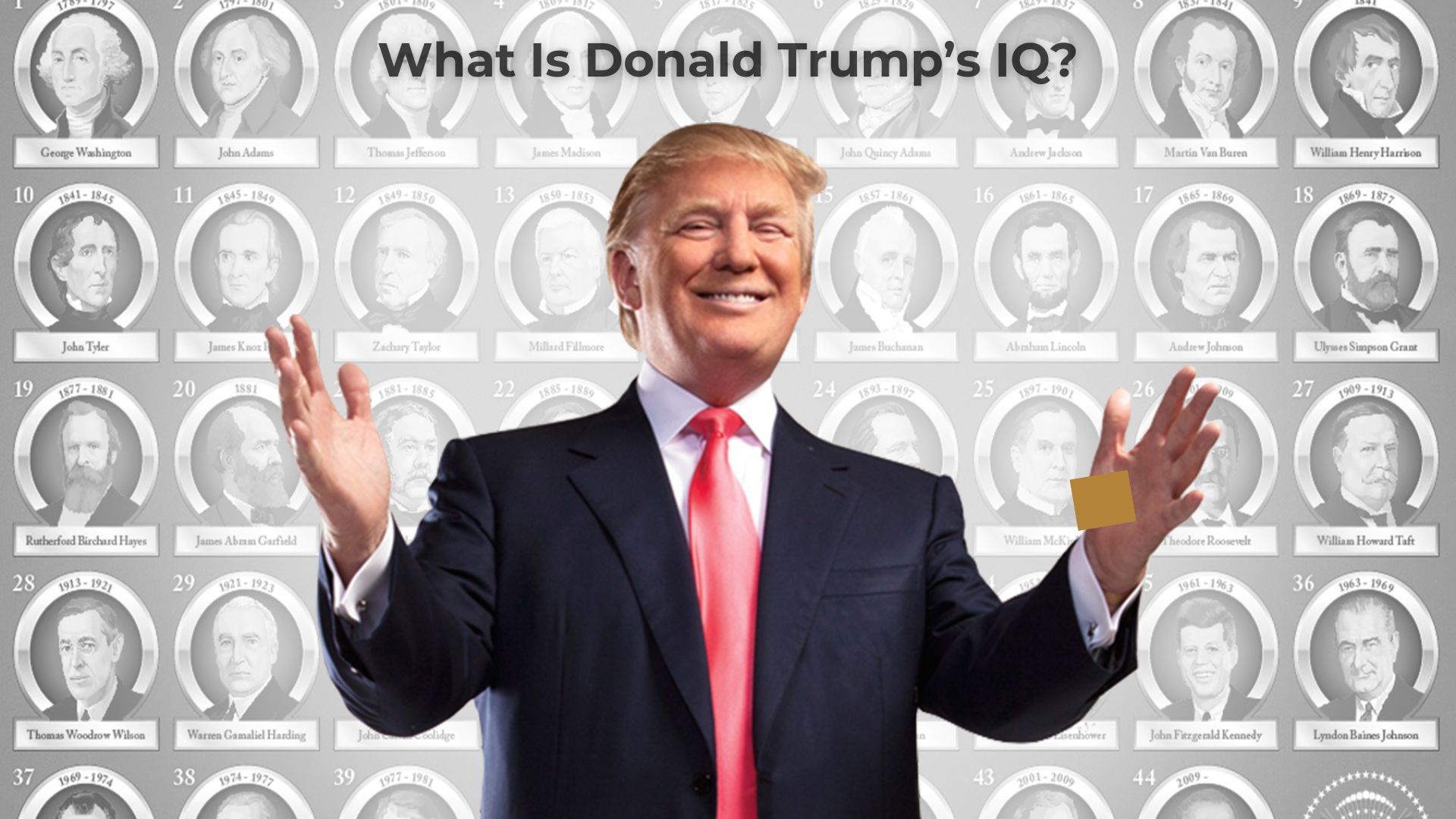Donald Trump. Just hearing his name probably sparks an opinion. Love him or hate him, one thing’s for sure—he knows how to stay in the spotlight. Over the years, discussions about Trump have ranged from his policies to his personality. But one topic that always seems to pop up in certain circles? His intelligence. On one hand, his father’s decision to send him to a military school rather than a prestigious prep school raises questions about his intelligence, on the other hand, there are speculations about Trump’s IQ ranging from from 120 to as high as 156.
There are no official records or statements and Trump himself has also never shared any official test scores. So, we analyzed various perspectives, from his educational background and business success to his political career to investigate if any correlation might be established that may reveal his intellectual capabilities.
The Basis for Speculation
Trump famously tweeted, “Sorry losers and haters, but my I.Q. is one of the highest—and you all know it!” in reference to his intelligence. His IQ is most commonly estimated to be approximately 145, which puts him in the 99.7th percentile and suggests a score greater than roughly 997 out of 1,000 people. However, as we already mentioned, this number is still purely speculative and any assertion regarding his IQ should be handled with caution in the absence of official test results or confirmed data.

Here’s the thing: there’s no official record of Trump’s IQ. Nothing. Nada. No test scores, no reports—just a lot of speculation. And most of it comes from methods like historiometry, where researchers estimate someone’s intelligence based on their achievements, education, and career. Psychologist Dean Keith Simonton, for instance, has used this approach to analyze the IQs of U.S. presidents, ranking John Quincy Adams and Thomas Jefferson among the smartest and putting folks like Ulysses S. Grant near the bottom.
But these methods are far from perfect. Simonton’s system is fascinating, but it’s not the same as sitting someone down and giving them a proper IQ test. So when people apply similar logic to Trump, the results are interesting but not definitive.
Can Trump’s Education and Early Life Give Us A Peek Into His Intellect?
Speculation about Donald Trump’s IQ often relies on similar methods, particularly focusing on his education at the Wharton School of Finance. For example, a 2015 article on BeforeItsNews.com estimated his IQ to be as high as 156, pointing to Wharton’s competitive admission standards as evidence. The article argued that Trump’s SAT scores—used as part of the school’s admission process at the time—would have translated to an IQ within the “genius” range, possibly qualifying him for elite groups like Mensa or the Triple Nine Society. However, this analysis has significant flaws.
First off, Trump entered Wharton as a transfer student, not as a freshman, so his admission was based on different factors, not just his SAT scores. This means his acceptance was likely influenced by his prior academic record, not solely the standardized test results. Also, Trump’s school transcripts have never been made public, leaving his actual academic abilities unknown. More credible estimates of his IQ, based on current Wharton SAT equivalents, suggest a score in the range of 145 to 149—still speculative, but probably more realistic.
Ultimately, while these historiometric methods provide some interesting perspectives, they are just approximations. There is no official IQ score for Trump, and most of the claims are based on conjecture rather than solid evidence.
Some critics argue that Trump’s academic records are kept sealed because they might not match the image of him as a “stable genius” that he often promotes. On the other hand, his supporters argue that his admission to Wharton and his later career accomplishments show he has a solid intellectual foundation.
Business Acumen
Trump’s business career is another piece of the puzzle. I mean, turning a $300 million inheritance into an empire valued at $6.6 billion is no small feat (Forbes’ numbers, not mine). His early success, like transforming the Grand Hyatt Hotel in New York, showcased some serious deal-making skills. But then there are the six bankruptcies, and while critics frequently point to his bankruptcies as evidence of poor business judgment, others see them as strategic moves—demonstrating his financial savvy and ability to navigate challenges. In this view, Trump leveraged the system to his advantage, using bankruptcy laws to restructure debts and continue his business ventures.
By the time of his father’s passing, Fred Trump’s estimated net worth was $300 million (approximately $600 million today). Donald Trump has since grown this inheritance into a fortune estimated at $6.6 billion—a 22-fold increase. This level of growth suggests a strategic intelligence, at least in business and branding.
Political Leadership
Trump’s entry into politics and his presidency add layers to the discussion about his intellect. His surprise victory in 2016 was widely seen as a masterclass in media manipulation and voter engagement. Critics argue that his unfiltered communication style and controversial statements reflect a lack of intellectual depth. Supporters contend that this very approach demonstrates a shrewd understanding of human psychology and media dynamics.

During his presidency, Trump oversaw significant economic growth, including historic lows in unemployment rates for minority groups. His negotiation style—whether with North Korea’s Kim Jong-un or in trade disputes—was unconventional but underscored his willingness to take risks and adapt strategies, qualities often linked to cognitive resilience and strategic thinking.
Public Perception, Criticism and The Role of Emotional and Social Intelligence
Despite these accomplishments, Trump’s intelligence has been a frequent target for criticism. Some point to public gaffes, such as historical inaccuracies or struggles with mental math during interviews, as evidence against a high IQ. His reliance on oral briefings over detailed reports has also drawn criticism, though it may reflect a preference for visual and auditory learning rather than a lack of comprehension.
IQ tests measure only certain types of cognitive ability, primarily logical and analytical skills. Trump’s career suggests strengths in other areas, such as emotional intelligence and social adaptability. His ability to connect with supporters, turn insults into rallying points (like the “garbage” comment during the 2024 campaign), and maintain relevance across different industries points to a form of intelligence that goes beyond traditional metrics.
In examining Donald Trump’s life and career, it has become abundantly clear to us that his intellectual profile is complex. Whether his IQ is 120, 145, or somewhere in between remains speculative. However, his achievements—both in business and politics—reflect a unique combination of strategic thinking, adaptability, and emotional intelligence. Critics may point to moments of inaccuracy or unconventional behavior, but supporters see a pattern of resilience and calculated risk-taking that has defined his success.
Ultimately, intelligence is multifaceted, and Trump’s life offers a case study in how different forms of intellect—strategic, emotional, and practical—can converge to shape extraordinary achievements. While the debate over his IQ may never be settled, understanding the broader dimensions of his career provides a more nuanced picture of the man behind the controversies.



